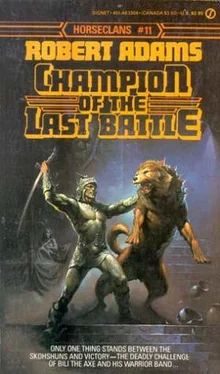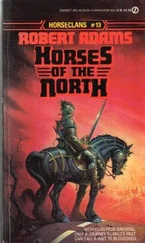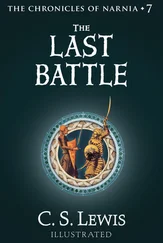A rocket and two mortar bombs demolished the massive gate to the glen and toppled one of the two flanking towers. Then Corbett sent Merle Bowley in under a flag of truce, threatening to visit worse destruction upon the entire glen and every living soul within it did not Erica and her party come out forthwith and unharmed.
Counter Tremain swallowed as much of Horseface Charley’s boastful bragging as he could stomach, then burst out, “Shitfahr, Horseface, awl you sayin’ is you’s up thar awl the fuckin’ day and you dint kill but three of them Kuhmbuhluhn bugtits, fer shore! By Plooshuhn, I could do thet good, I swanee, and I ain’ nowhars near’s good with a ryfuhl as you is.”
And that, thought Counter morosely, was how he now came to be making his slow, careful way up the mountain to the spot that Horseface had described to take the Ganik marksman’s place on the morrow, to lie almost motionless through all the hours of daylight in a hole scooped out of the rocky soil and shoot at any Kuhmbuhluhner foolish enough after the preceding day to show his head or body as a target.
In answer to Counter’s rebuttal of Horseface’s braggadocio, Erica had answered calmly, “No, he only killed three, but his killing of them served the purpose for which he was there. Even from down here in the camp, we could see that very few figures were visible on the walls, towers or barbican for longer than mere fleeting instants of time after those three were downed. And that is just what the brigadier wants—fewer and less vigilant watchers in those areas.
“As for your suggestion, Counter,” she had smiled, “I do think that one day at a time up there is enough for any of you. Charley has blazed the way now, so you will go up tonight and take the position for tomorrow. If anyone does offer a good target, by all means do your damnedest to hit him, of course. But I doubt if more than one will, probably early on in the day, and when once they learn you’re still shooting at them, they’ll doubtless do a repeat of today—staying low and out of sight as much as possible.
“As I told Charley last night, if you move as little as possible, there’s no way that you can be spotted, not with that silencer-flash-hider on the rifle. When we found that rig back at the landslide, I couldn’t imagine what we’d ever use it for or when, but I’m very glad now that I brought it along anyway.”
“But Ehrkah,” Counter had protested, not in the least relishing the thought of a day lying motionless in a hot, cramped hole under a pile of rocks, “I ain’ nowhars near as good a ryfuhl shooter as ole Horseface is. Chances is, evun if I’s to shoot atairy one them Kuhmbuhluhners, I ain’ gonna hit ’em. Naw, Ehrkah, I thanks Horseface, he awta go back up thar t’naht, not me.”
She had shaken her head of black, glossy hair and replied, “Counter, shooting, hitting, killing the men on those walls and fortifications is unimportant, really. The thing that is of importance is to keep them down and off the higher points altogether, if possible, so it’s of little moment whether you hit them or not. No, you go up tonight and come back after dark tomorrow. Then Charley can do it again.”
And so, with the woods-wise stalking ability of the outlaw Ganik he had been for most of his life, Counter Tremain was making his cautious way up the slope, flitting from rock shadow into shallow depression and back to rock shadow, himself only a shadow in the wan moonlight. For most of the way the going was merely difficult, but in places it was so precipitous as to be almost impossible—several times he had to shuck off his new pair of Skohshun pikeman’s boots, sling them around his neck and use his freed toes as well as his strong fingers to seek, find and use tiny cracks and crevices and invisible ledges to negotiate an advance over and up the smooth-seeming rockfaces.
But finally he was there, in the proper area. Booted feet first, Counter slid into the long, narrow hole and, after settling himself into the most comfortable position he could manage, began to pile up reachable rocks to form a rest for the barrel of his rifle. That done and the camouflaged weapon resting in place, the Ganik bully—still panting and copiously sweating from the exertions of ascent to this spot—rolled over on his back and unslung the waterskin with intent to refresh himself.
And that was when the thick, weighty slab of rock which overlay and covered his burrow seemed to float of its own volition upward, then huge-feeling but unseen hands grasped Counter’s body, jerked it out of the hole and shook it as a dog would shake a rat, until all the world and all time roared about him in a barely seen black-red roaring and consciousness departed him all in a rush.
Nature had not endowed Paget’s Glen as well as she had Sandee’s Cot, so it had been necessary for the long-dead men, Teenehdjooks and Kleesahks who had designed and constructed its defenses to carve off the outer faces of many of the hills. The stone thus quarried had been utilized for the walls to span the gaps between the hills, their towers and the approach fortifications, as well as the thick, lofty main keep within the glen.
Like the ancestors of Count Sandee, those of Marques Paget had, as soon as a more comfortable habitation was built, used the tower keep as a combination armory, stables and temporary guest-housing. Even so, it was not big enough by half to house the multiracial force now led by Count Sandee and Sir Geros. So only the Middle Kingdoms Freefighters inhabited it, while the Ahrmehnee and Moon Maidens camped by preference in the wooded hills just beyond the glen’s outer defenses, spending most of their time in hunting, feasting on their kills, drinking the copious quantities of beer provided by their hosts and dancing around their fires far into each night to the wild, rhythmic music that was an integral part of the heritage of their race.
They stayed a week, then took to the trails again, reinforced by the hundred or so fighters of Paget’s Mark. They then rode toward the second destination in their winding, roundabout advance—the safe glen ruled over by Count Rik Nalliss. Then, stronger by some seventy warriors—many of these a bit long in the tooth, but scarred by many a hard-fought campaign and more than willing to undertake another for their new king against the alien invaders—the column angled on northwestward in the direction of the next safe glen.
But Count Nalliss’ contingent was the last large one; all of the latterly joined ones were of fifty men or less, usually less. Not even these trickles were refused a place in the slowly swelling ranks, however, Count Sandee and his fellow nobles being willing to accept any Kuhmbuhluhner who could fork horse and swing steel on behalf of King Byruhn.
So as the relief column began to toil up the southerly reaches of the range separating them from northern Kuhmbuhluhn and the besieged capital, almost fourteen hundred fighters followed the massed banners along the mountain track that Duke Bili and his condotta had traversed earlier that year.
For most of the way through that range, they found it easy to subsist on the flesh of wild ponies, deer and other game, along with roots and herbs, greens and wild fruits, while still maintaining a decent rate of march. But one and all they longed to reach the plain where, they hoped, there would be something other than rock-ale—water—and fresh breads.
Although many or most of the New Kuhmbuhluhn noblemen maintained the customs and usages of their rank on the march—being cooked for, served and otherwise waited upon by servants all had brought along—the lowlanders, both noble and common, were far less formal, so the scene and conversation that took place one night was not uncommon at all.
Читать дальше












